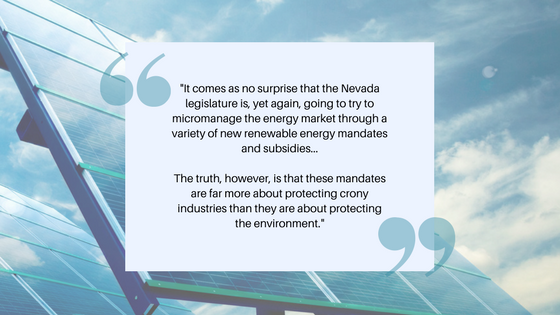
The “Green Energy” lobby is about cronyism, not polar bears
By Michael Schaus
It comes as no surprise that the Nevada legislature is, yet again, going to try to micromanage the energy market through a variety of new renewable energy mandates and subsidies.
Sadly, it is even less of a shock that opposition to these initiatives is scarce, to say the least.
After all, the “green energy” movement has done a fantastic job portraying itself as the defender of the environment — indifferent to the profit motive and agnostic about the self-interests of various energy industries.
It’s been a remarkable marketing accomplishment. Consider the quintessential picture of a polar bear stranded on a floating iceberg — an image now intrinsically tied to the debate of global warming. That single image helped shape the hearts and minds of an entire generation of young adults concerned about the impact mankind has had on the environment.
Of course, pictures aren’t always the whole story. Polar bears, for example, can swim nearly 200 miles, and icebergs float at a mere 0.5 miles per hour. If the polar bear in that iconic photo had truly become hopelessly stranded hundreds of miles from land on a slow-moving iceberg, it would have had more to do with Darwinism than global warming.
Nonetheless, lobbyists and indeed entire industries have adopted the environmental cause as a manipulative way to strum the public’s heartstrings — while building support for regulatory favoritism and taxpayer-subsidy schemes.
Solar companies, for example, are pushing for a return to more favorable “net-metering” rates, in an effort to reestablish a government-created regulatory scheme that made their Nevada businesses profitable.
But the “green energy” agenda in the Silver State goes further than just rooftop solar. One bill, AB206, would aggressively amp up the state’s already costly Renewable Energy Mandates.
Under the initial language of AB206, half of all the energy in the state would be required to come from “renewable” sources by 2030, and more than 80 percent by 2040.
As excessive as these mandates are, it’s important to realize why the green movement believes such over-the-top government coercion of the marketplace is necessary: because such “reforms” necessarily mean unbearably hefty price tags for consumers and ratepayers.
A 2014 study published by the center-left Brookings Institution concluded that replacing more conventional power supplies with solar power would roughly triple electricity prices.
Even the Obama Administration — which promoted higher renewable energy mandates through numerous regulatory means — confirmed that new “renewable” energy sources created in 2016 would contribute significantly to future rate increases.
Of course, it’s all “worth it” to keep polar bears from becoming stranded on icebergs, right? After all, the green energy lobbyists tell us, a larger energy bill is a tolerable price to pay for “protecting the environment”.
The truth, however, is that these mandates are far more about protecting crony industries than they are about protecting the environment.
The sun certainly does shine every day in Nevada, but solar arrays don’t exactly grow on trees. In fact, there is very little about the production of solar equipment — including the rare-earth materials that are largely sourced from developing countries with little or no environmental oversight — that can be described accurately as “renewable.”
To drive this point home, it’s worth pointing out that Nevada’s current energy standards don’t actually take into account the overall environmental impact of the energy it mandates.
According to a 2016 study done by the Nevada Policy Research Institute, wind power is among the most overall environmentally damaging. And yet, “wind power receives favorable treatment under Nevada’s renewable power mandate, while environmentally superior hydro, nuclear and natural gas are discouraged.”
And while solar is rated fairly clean — compared to dirty alternatives such as coal — the high price suggests that other forms of energy would better balance economic and ecological concerns.
Unfortunately for ratepayers, it seems clear that a few politically connected “renewable energy” cronies have a pretty effective marketing campaign — and even better lobbyists.
This commentary was originally published by Nevada Business.